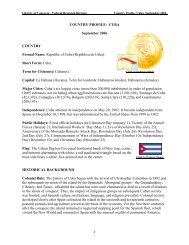1 - American Memory
1 - American Memory
1 - American Memory
You also want an ePaper? Increase the reach of your titles
YUMPU automatically turns print PDFs into web optimized ePapers that Google loves.
219<br />
Mr. TAMIHIA. My name is Fred I. Tamura. I am in business. I am<br />
vice president of Meadow Gold Dairy, a subsidiary of Beatrice Foods,<br />
Inc. I am a citizen of the United States of America, residing in the<br />
State of Hawaii.<br />
I would like to thank you very much, Mr. Chairman and members of<br />
the subcommittee, for holding this hearing at this time of the year. As<br />
stated earlier, I represent this group and this group basically is made<br />
up of all nationalities, small businessmen as characterized earlier, a<br />
small business group representing 83.6 percent of the business that is<br />
conducted in the State of Hawaii nmning an average of 1 to 7<br />
employees.<br />
Mr. Chairman, speaking for the group, I ask your favorable con-<br />
sideration of a reasonable bill, H.R. 7189, introduced by your fellow<br />
Congress Members, Representatives Mink and Matsunaga.<br />
For Hawaii—and I believe I express the sentiments of all Hawaii,<br />
no legislation in the U.S. Congress has received interest and support<br />
from all segments of the citizenry as H.R. 7189 since the enactment of<br />
statehood for Hawaii 15 years ago.<br />
Hawaii being an island State, our only mode of transportation is<br />
via ocean carriers and limited air cargo. Our point of entry to the<br />
State is limited to the harbors, basically Honolulu. There are trans-<br />
shipments to the island and two airports, one in Honolulu and the<br />
other one in Hilo. We have no interstate highways, no trains, trucks,<br />
buses nor automobiles as a means of transportation with other States.<br />
When Hawaii is caught in the grip of a mainland waterfront strike,<br />
the only contact with the rest of our sister States would be by the trunk<br />
air carriers that would originate at the least from San Francisco or<br />
Los Angeles, 2,400 miles away. Obviously a similar situation can<br />
hardly ever come to exist with any of the other 40 States.<br />
Because of the frequency and unpredictable length, the general pub-<br />
lic in Hawaii has a knee-jerk reaction to the news that a west coast<br />
strike might occur—and they react only a little less so if one is threat-<br />
ened on the east or gulf coasts.<br />
Panic buying occurs, as in the case of toilet paper, salt, flour and rice<br />
in 1971 and 1972 when a series of strikes cut Hawaii's supply line for<br />
a total of 175 days in 18 months. The shelves were left bare of these<br />
and other items for weeks and unavailable to those who did not hoard,<br />
mostly the poor.<br />
Hawaii's wholesalers and retailers maintain inventories of non-<br />
perishable commodities far beyond the volume and duration elsewhere<br />
in the Nation—as a hedge against unexpected strikes. When one is<br />
anticipated, supply houses and merchants expand a normal 4-month<br />
inventory to a 5- or 6-month supply. With warehousing costs at 30<br />
cents to 40 cents a square foot per month, plus the high financing costs<br />
incurred during this holding period, there is a high added cost of<br />
doing business that is passed on to the consumer.<br />
The effects on small businesses are severe. They can't finance usually<br />
large inventories, can't get aircraft space during a strike and are<br />
unable to withstand loss of business for any length of time.<br />
Construction is hard hit within a few weeks—^there is no way to air-<br />
lift lumber, pipe, steel beams or bathtubs. Even when we don't foresee a<br />
strike our supply houses have to play it safe by carrying large inven-



![Albert Einstein Papers [finding aid]. Library of Congress. [PDF ...](https://img.yumpu.com/21604228/1/190x245/albert-einstein-papers-finding-aid-library-of-congress-pdf-.jpg?quality=85)





![American Colony in Jerusalem Collection [finding aid]. Library of ...](https://img.yumpu.com/17941275/1/190x245/american-colony-in-jerusalem-collection-finding-aid-library-of-.jpg?quality=85)



![Piccard Family Papers [finding aid]. - American Memory - Library of ...](https://img.yumpu.com/17941234/1/190x245/piccard-family-papers-finding-aid-american-memory-library-of-.jpg?quality=85)


